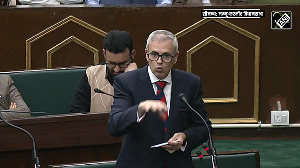Film producers are going on a strike from April 4 due to a tiff with multiplex owners regarding revenue sharing. And like many other multiplex owners, Shravan Shroff -- Managing Director, Fame India Limited -- is getting blamed for this upcoming strike.
The producers have demanded 50 percent revenue sharing from unwilling multiplex owners. Producers claim that this pattern is being followed in the West, and that India should follow suit. Multiplex owners, on the other hand, have stated that as they are still in the nascent stage, this pattern will take time to follow.
"Fame's 21 properties with 74 screens are open and will be selling tickets. It is upto the producers to decide whether they want to show their films or not," Shravan says firmly.
Multiplexes have been in India for 10 years now, and have become the most popular form of entertainment for the burgeoning Indian middle class. Realising this, producers have woken up to the phenomenon by demanding a larger piece of the revenue pie.
Syed Firdaus Ashraf spoke to Shravan to find out if a solution to the stalemate was possible.
Why can't multiplex owners like you agree to 50 percent revenue sharing with the producers?
Fifty percent revenue sharing does not work for us. We have proposed to pay more on the basis of a film's performance. If the film does well, the share can go upto 50 percent. If the film flops, we need to go below the threshold. The ratio cannot always be the same. But producers don't agree with this.
There was a particular production company that started this revenue sharing problem.
I'm not blaming anybody. Producers and exhibitors [multiplex owners] were living in a nice cocoon. Certain things happened in 2005 and that changed the revenue sharing process.
What happened?
There was a bunch of producers, who pushed exhibitors to share more revenue.
Can you name these producers?
I reserve my comment on that. But everybody knows the truth.
There was one film that triggered the crisis...
Yes. Fanaa. And you know who the producers were [Yash Raj Films].
If a film does not do well, what is the revenue sharing like?
Fifty percent cannot be the starting point. We have asked them to discuss and decide what the threshold should be. Producers are adamant and do not want to engage in any kind of discussion unless we agree to share half the profit.
What about the charges that multiplexes earn from other amenities?
Everyone thinks that others are making more money than them. I can easily turn around and say that producers are making money from corporate sponsorship.
In nine out of 10 cases, parking is not controlled by multiplex operators. They are controlled by the shopping malls. Even if they do, how does it matter to the producer?
We believe our logical share is only the box office.You had said a Shah Rukh Khan film deserves more premium than an Emraan Hashmi one. But the fact remains that Raaz -- The Mystery Continues did more business than Shah Rukh's Billu. How can you decide, before a film releases, which film should be given a 50 percent revenue share? How can you judge a film's fate even before it releases?
Nobody can. A classic example is Chandni Chowk to China. It flopped while Imran Khan's Jaane Tu... Ya Jaane Na was a superhit. Make a benchmark -- if a film does well, then you take a larger share from us. If it does not, then take less.
Why don't you go the way single screen theatres do? The producers a fixed amount to the theatre owners.
Will you pay the same amount for a Mercedez Benz as you pay for a Maruti 800? There are no collections in single screen theatres today. Almost 65-70 percent of collections comes from multiplexes. The business has changed. We cannot judge the business as it used to be in the past.
A film's run in theatres has become shorter. Until three years ago, 45 percent of the revenue came in the first week. Now, 63 percent of revenue comes in the first week.
The producers also say the money that multiplex owners earn from screening a film is not delivered to them on time. How far is this true?
I disagree with that. Our collections are computerised and e-mailed everyday. So there is no way that the collections don't reach on time. We have never received any formal complaint from anyone. In fact, I have proof of getting e-mails at 2 am.
So what are your demands?
We are not demanding anything. The producers are. We are negotiating. Give us good films and we will run them in our multiplexes.
But we are confused on how to tackle piracy.
Both of you cannot survive without each other...
Agreed. We are willing to run their films and will be disappointed if they go on a strike.
Do you think this will be solved before April 4?
I am optimistic.






 © 2025
© 2025